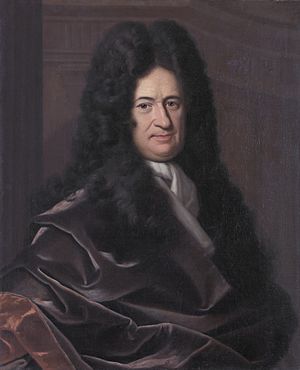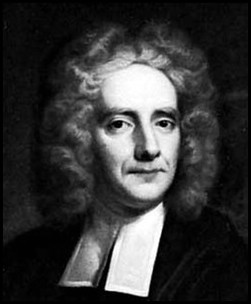Leibniz–Clarke correspondence facts for kids
The Leibniz–Clarke correspondence was a famous exchange of letters between two brilliant thinkers: Gottfried Wilhelm Leibniz from Germany and Samuel Clarke from England. Clarke was a strong supporter of Isaac Newton. This debate happened through letters in 1715 and 1716.
The exchange started when Leibniz wrote a letter to Caroline of Ansbach. He suggested that Newton's ideas about physics might not fit well with ideas about God and nature. Clarke quickly replied to defend Newton's views. The letters went back and forth until Leibniz passed away in 1716.
Many different topics were discussed in these letters. But the most interesting part for people today is the big disagreement about space. Newton and Clarke believed in an absolute space, like a fixed stage where everything happens. Leibniz, however, thought of space as just the relationships between objects.
Another important part of their debate was about free will. They also argued about whether God had to create the best of all possible worlds.
Leibniz had not published many of his deep philosophical ideas before this. So, these collected letters were very exciting to people at the time. The public also remembered the big argument between Leibniz and Newton about calculus. Many people believed that Newton himself was secretly guiding Clarke's replies.
Contents
The Big Ideas in the Debate
What is Space?
One of the main arguments was about space. Newton and Clarke thought space was like a giant, invisible box. This box was always there, no matter what was in it. They called this "absolute space." It was like a fixed background for everything.
Leibniz disagreed. He believed that space wasn't a real thing on its own. Instead, he thought space was just the way objects relate to each other. For example, if you have two balls, the space between them is just how far apart they are. If you remove the balls, the "space" disappears too.
Free Will and God's Choice
Leibniz and Clarke also debated about free will. They wondered if humans truly have the freedom to choose. This led to questions about God's power.
Leibniz believed that God chose to create the "best of all possible worlds." This meant that out of all the ways the world could have been, God picked the very best one. Clarke had different ideas about how God's power worked and how it related to human freedom.
Why This Debate Mattered
This exchange of letters was very important. It showed the different ways people thought about the universe. It also highlighted the ongoing rivalry between the ideas of Leibniz and Newton. Even though it was a debate through letters, it shaped how people thought about science, philosophy, and religion for many years.
See also
- Philosophy of space and time
- Principle of sufficient reason
 | John T. Biggers |
 | Thomas Blackshear |
 | Mark Bradford |
 | Beverly Buchanan |



